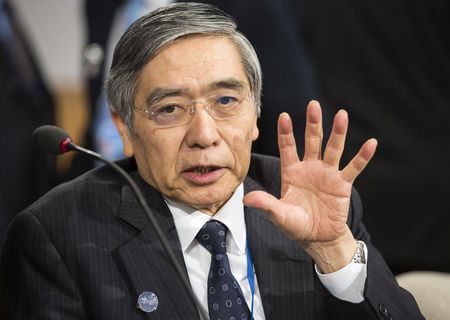By Leika Kihara
TOKYO (Reuters) - Most Japanese regional economies continue to recover as the pain from a sales tax hike in April starts to ease, the Bank of Japan said in a quarterly report, maintaining its optimism on the outlook despite growing signs growth may be losing momentum.
BOJ Governor Haruhiko Kuroda also stuck to his upbeat tone in a speech to a meeting of the central bank's regional branch managers, saying that the economy is set to recover moderately as a trend although there are some weaknesses in factory output.
"As for the outlook, the economy will continue to recover moderately as a trend, with the effect (of the sales tax hike likely to gradually subside," he said on Monday.
In a quarterly report on the regional economy, the BOJ maintained its assessment for eight of the country's nine regions to say they continue to recover moderately as a trend.
Only the northeastern Tohoku region cut its assessment from the previous report issued in July.
"Domestic demand is firm as job and income conditions steadily improve," the October report said, adding that most regions are seeing private consumption emerge from the pain inflicted by the April tax hike.
The regional economic report will be among factors the BOJ will scrutinise at its policy-setting meeting on Oct. 31. At the meeting, the BOJ will also release fresh long-term economic and price projections that serve as a benchmark for future monetary policy decisions.
The BOJ has stood pat on monetary policy since launching an intense burst of stimulus in April last year, when it pledged to double base money via aggressive asset purchases to achieve its 2 percent inflation target in roughly two years.
Recent weak data has cast a shadow over the BOJ's optimism that the economy is on course for a moderate recovery. Factory output slumped as companies were saddled with a huge pile of inventory due to sluggish demand after the April tax increase.

A recent Reuters poll showed Japanese business confidence slipped to its lowest in 1-1/2 years in October, a further sign Tokyo may be forced to offer fresh policy support to recharge an economy ailing from the tax-hike pain.
(Reporting by Leika Kihara; Editing by Chris Gallagher and Jacqueline Wong)
